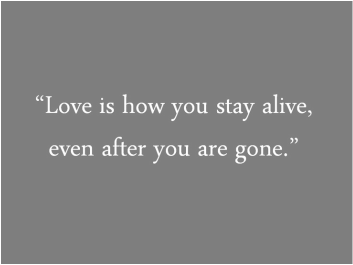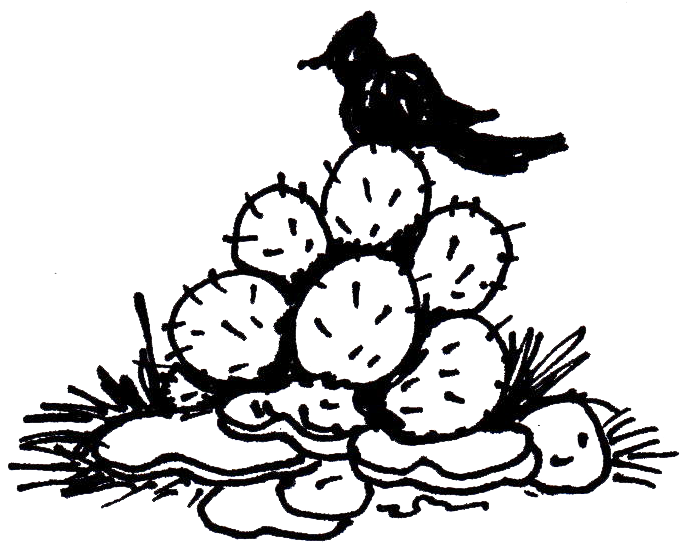The first time I saw him was in Paso Lajitas, Mexico.
We spent the night, my boyfriend and I, in a house I knew was his, but he never mentioned that his parents lived there, too. We arrived at three AM when the place was dark and still. I assumed we were alone.
The next day a woman was sweeping the kitchen, and a man was raking the yard. I hadn’t really taken this in when a chubby child burst through the screen door, letting it bang shut behind him. I thought he was a neighbor boy, but he hadn’t bothered to knock.
The wrinkled woman wielded her broom with frightening intensity. She hadn’t combed her hair yet, and her Spanish was impossible to understand, and she was talking to me. I had managed, “Buenos días”, but barely spoke more than that, and she rolled off a long string of questions or directives—or something.
I tried to leave, but when I started walking towards the Rio Grande, she began to squawk and flail her arms. She was concerned I was leaving without an adiós or a cup of café. I finally got it that I was to have coffee in her house, at her table. I went back obediently, sat down, and pondered these odd people who had turned up in my boyfriend’s home.
Halfway through the first cup, which tasted like the river but worse, my boyfriend staggered out of the bedroom, blushed deeply, and sat across from me. We mumbled “Buenos Días” to each other, and then the woman descended on him with a steaming cup of river-y brew and a million run-on words.
He held his hangover-tortured head in his hands. All I understood of the entire conversation was when he said, “Por favor, Mama, silencio.”
He had called her Mamá.
His mother had essentially caught us in the act.
And there was this boy gawking from the kitchen. For whatever reason, he found me riveting. I found him somewhat repulsive in his grimy shirt and oversized belly. Since he was staring, I smiled, but he only stared, his mouth open slightly. I had no patience for children. I didn’t dislike them; I simply didn’t bother with them.
On top of everything else, the child had no table manners. He ate like a pig, and the old woman encouraged him, as if he needed her help.
When we left, the woman smiled and had many words for me. They seemed kind, but I was lost and said almost nothing. The grubby boy snickered. I glowered at him and hoped I’d never run into him again.
Eventually my boyfriend and I were properly married in Texas. The nameless boy was at our wedding, grabbing food off tables laden with it and discussing me with his equally filthy little friends. They dashed around the guests, giggled, made faces and farting noises.
I finally asked my new husband, “Who is that boy?”
He motioned to the reprobate, who didn’t hesitate to come forward.
“This is your nephew, Manuel.” Then he explained to the boy that I was his Tía Beth.
The boy named Manuel held out a grungy hand, and I had no choice but to take it. I was now related to the little insect. He grinned.
* * *
Twenty-seven years later I’m sitting in room nine of the intensive care unit in Odessa Medical Center Hospital, looking at Manuel, a man I love so much I think my heart will burst. He’s had a stroke at the young age of thirty-seven. Machines breathe for him, feed him, medicate, and hydrate him. A machine carries waste from his body to a bag. Another massages his feet so he won’t have blood clots in his legs.
“Wake up, Manuel. You have to wake up.” My words remind me of his school days when he was sometimes reluctant to rise and shine.
“You must wake up. You have to.”
Nobody could wake him, but I was arrogant enough to think he would come out of a coma for me. After all, I had loved him since he was ten, taught him to bathe and dress in clean clothes every morning. I even taught him to use a flush toilet.
It started with, “Will you enroll my nephew in Terlingua School?”
I did it for my new husband whom I adored. I married one man but got two. It took less than five weeks to fall in love with Manuel. Why hadn’t I noticed how cute he was, how happy and easy to get along with? And what a big heart he had?
Now that heart is enlarged, strained; his blood pressure rages and his brain is badly damaged. Then the doctors drop by to say there’s a 97% chance he’ll never wake up.
This cannot be happening, not to Manuel.
* * *
I began to take him places because he’d never been anywhere. In Alpine, there was a five-and-dime that had a section devoted to toys, so I took him and said I’d buy him one thing, his choice. He perused aisle after aisle, eyes wide with wonder. After lengthy deliberation, he chose a helmeted man on a motorcycle. As far as I know, he still has it. He seldom played with it and kept it on a shelf. Many more toys would follow, but that one was special, to both of us.
For lunch that day he had his first American cheeseburger and French fries. While eating, he shyly asked if I was a gringa.
I admitted I was.
He gave this the same long deliberation he had given his choice of toys. I thought I knew what he was thinking. He had heard negative things about gringos, and maybe something had been said about me in particular. I hadn’t exactly made an impressive debut with his family.
His big brown eyes held mine a long time, and then he asked, “Are you sure?”
I laughed and said I was. Why did it matter? He shrugged, avoiding the question.
We were leaving the restaurant when he looked up at me, his eyes shining with emotion. “I like you anyway,” he assured me.
I told him I liked him, too, and as he took my hand, I realized the little insect had effortlessly infested my heart.
* * *
Now we imagine that he still hears us, so we talk to him. The doctors say he can’t hear. It’s not his ears—they work fine. The brain he needs to process the sound does not. So we touch him until they instruct us not to. They don’t want him over-stimulated. His blood pressure still rages out of control. We can’t talk to him or touch him so we watch him, willing him to open his eyes.
I wordlessly beg him to wake up, but somehow I know he won’t. I sit with him, talking to him in my head. Thank you for sharing your wonderful self with me, Manuel. The world will be different without you in it.
I want to gather him onto my lap and kiss him, tickle him, make him laugh, make it all better.
It will be so hard to let you go.
The ventilator makes a steady, rhythmic sound. My daughter, his sister Margarita, stands next to me with tears rolling down her face.
* * *
From the day I brought her home from the hospital he referred to her as his sister. She never knew differently until elementary school. Anyway, in our family, relationships are cloudy, and others are confused by who’s who. I refer to Manuel as my son and he calls me Mom. I was his aunt for only weeks. I became his mother without realizing it. There was no special day to commemorate.
Manuel was a gift I accepted without question, which was strange for a woman immune to children. I can’t explain it except to say it was a chubby, dirty boy who changed me.
One day we were lying on my bed, counting Margarita’s fingers and toes for the thousandth time and marveling at the perfection of her tiny self.
Manuel looked over at me. “Right that I have your blood, too?” He needed to belong, those eyes said, and he wanted to belong to me.
“No, Manuel, you don’t,” I said, “but you have something more important than my blood.”
His eyes were huge. “What’s that?”
“You have my heart.”
* * *
Day eight of the hospitalization: His team of doctors wants to meet with the family. Five of us are chosen to listen to their dire prognosis. These guys give new meaning to “grim.” They have to replace the breathing tube which is now causing damage to his throat. They can do this with a tracheotomy and at the same time install a feeding tube in his stomach.
They believe, according to the latest brain scan, that Manuel is in a vegetative state. His chance of waking is 1%. And if he awakens, he’ll likely not know anyone or even himself. I thought that was terrible news but then they dropped the bomb: We can keep him alive for years, but at what cost to him? Once we install the breathing mechanism in his throat, if God wants to take him, he won’t be able to go. Later, when the family realizes the kind of life they’ve chosen for him, the only way to let him go would be to remove his feeding tube and medications. In other words, you’d have to choose to kill him.
I can’t grasp the horror of that.
* * *
Before Manuel spoke much English, I tutored him on what to say if we were stopped by Border Patrol (his one great terror): “What is your citizenship?” “American.” “Where were you born?” “Odessa, Texas.”
We did get stopped, by a female Border Patrol agent. Manuel’s eyes were huge. She leaned towards the window and asked my citizenship.
“I’m an American citizen,” I said, loudly and clearly, so he would remember what we had practiced.
She then asked Margarita’s citizenship. “She’s an American citizen,” I said again, loudly, so Manuel would take the hint.
But when she asked him, he froze.
She repeated the question differently, “Of what country are you a citizen?”
Manuel said proudly, “Odessa, Texas!”
She and I laughed and she let us go on.
A few years later, Manuel introduced me to George Strait and wherever we drove we listened to him at high volume. When I tried to sing along, he would make the sound of a police siren. Irritating, but so comical I had to laugh.
He could also do the best impromptu rap I’ve ever seen. Manuel was always entertaining us.
* * *
So. Boiled down, our choices are to remove the breathing tube, unplug the various machinery doing various jobs, and let him go quietly, or to relegate this man we love to years of a vegetative partial-existence. My God, what kind of choice is that?
A young man of fifteen, much like his father, steps up. “My Dad wouldn’t want that,” he says, so sure we all hear it. Anthony will carry on his dad’s legacy: big heart, kindness to all, and endless good humor.
As his body dies, I hold Manuel’s big hand and worry that he never knew the extent of my love or how much I appreciated his sense of humor and the kind things he did for me. In every way that matters, he was my son. The depth of my grief surprises me, but I don’t know why since he still has my heart.
We spent the night, my boyfriend and I, in a house I knew was his, but he never mentioned that his parents lived there, too. We arrived at three AM when the place was dark and still. I assumed we were alone.
The next day a woman was sweeping the kitchen, and a man was raking the yard. I hadn’t really taken this in when a chubby child burst through the screen door, letting it bang shut behind him. I thought he was a neighbor boy, but he hadn’t bothered to knock.
The wrinkled woman wielded her broom with frightening intensity. She hadn’t combed her hair yet, and her Spanish was impossible to understand, and she was talking to me. I had managed, “Buenos días”, but barely spoke more than that, and she rolled off a long string of questions or directives—or something.
I tried to leave, but when I started walking towards the Rio Grande, she began to squawk and flail her arms. She was concerned I was leaving without an adiós or a cup of café. I finally got it that I was to have coffee in her house, at her table. I went back obediently, sat down, and pondered these odd people who had turned up in my boyfriend’s home.
Halfway through the first cup, which tasted like the river but worse, my boyfriend staggered out of the bedroom, blushed deeply, and sat across from me. We mumbled “Buenos Días” to each other, and then the woman descended on him with a steaming cup of river-y brew and a million run-on words.
He held his hangover-tortured head in his hands. All I understood of the entire conversation was when he said, “Por favor, Mama, silencio.”
He had called her Mamá.
His mother had essentially caught us in the act.
And there was this boy gawking from the kitchen. For whatever reason, he found me riveting. I found him somewhat repulsive in his grimy shirt and oversized belly. Since he was staring, I smiled, but he only stared, his mouth open slightly. I had no patience for children. I didn’t dislike them; I simply didn’t bother with them.
On top of everything else, the child had no table manners. He ate like a pig, and the old woman encouraged him, as if he needed her help.
When we left, the woman smiled and had many words for me. They seemed kind, but I was lost and said almost nothing. The grubby boy snickered. I glowered at him and hoped I’d never run into him again.
Eventually my boyfriend and I were properly married in Texas. The nameless boy was at our wedding, grabbing food off tables laden with it and discussing me with his equally filthy little friends. They dashed around the guests, giggled, made faces and farting noises.
I finally asked my new husband, “Who is that boy?”
He motioned to the reprobate, who didn’t hesitate to come forward.
“This is your nephew, Manuel.” Then he explained to the boy that I was his Tía Beth.
The boy named Manuel held out a grungy hand, and I had no choice but to take it. I was now related to the little insect. He grinned.
* * *
Twenty-seven years later I’m sitting in room nine of the intensive care unit in Odessa Medical Center Hospital, looking at Manuel, a man I love so much I think my heart will burst. He’s had a stroke at the young age of thirty-seven. Machines breathe for him, feed him, medicate, and hydrate him. A machine carries waste from his body to a bag. Another massages his feet so he won’t have blood clots in his legs.
“Wake up, Manuel. You have to wake up.” My words remind me of his school days when he was sometimes reluctant to rise and shine.
“You must wake up. You have to.”
Nobody could wake him, but I was arrogant enough to think he would come out of a coma for me. After all, I had loved him since he was ten, taught him to bathe and dress in clean clothes every morning. I even taught him to use a flush toilet.
It started with, “Will you enroll my nephew in Terlingua School?”
I did it for my new husband whom I adored. I married one man but got two. It took less than five weeks to fall in love with Manuel. Why hadn’t I noticed how cute he was, how happy and easy to get along with? And what a big heart he had?
Now that heart is enlarged, strained; his blood pressure rages and his brain is badly damaged. Then the doctors drop by to say there’s a 97% chance he’ll never wake up.
This cannot be happening, not to Manuel.
* * *
I began to take him places because he’d never been anywhere. In Alpine, there was a five-and-dime that had a section devoted to toys, so I took him and said I’d buy him one thing, his choice. He perused aisle after aisle, eyes wide with wonder. After lengthy deliberation, he chose a helmeted man on a motorcycle. As far as I know, he still has it. He seldom played with it and kept it on a shelf. Many more toys would follow, but that one was special, to both of us.
For lunch that day he had his first American cheeseburger and French fries. While eating, he shyly asked if I was a gringa.
I admitted I was.
He gave this the same long deliberation he had given his choice of toys. I thought I knew what he was thinking. He had heard negative things about gringos, and maybe something had been said about me in particular. I hadn’t exactly made an impressive debut with his family.
His big brown eyes held mine a long time, and then he asked, “Are you sure?”
I laughed and said I was. Why did it matter? He shrugged, avoiding the question.
We were leaving the restaurant when he looked up at me, his eyes shining with emotion. “I like you anyway,” he assured me.
I told him I liked him, too, and as he took my hand, I realized the little insect had effortlessly infested my heart.
* * *
Now we imagine that he still hears us, so we talk to him. The doctors say he can’t hear. It’s not his ears—they work fine. The brain he needs to process the sound does not. So we touch him until they instruct us not to. They don’t want him over-stimulated. His blood pressure still rages out of control. We can’t talk to him or touch him so we watch him, willing him to open his eyes.
I wordlessly beg him to wake up, but somehow I know he won’t. I sit with him, talking to him in my head. Thank you for sharing your wonderful self with me, Manuel. The world will be different without you in it.
I want to gather him onto my lap and kiss him, tickle him, make him laugh, make it all better.
It will be so hard to let you go.
The ventilator makes a steady, rhythmic sound. My daughter, his sister Margarita, stands next to me with tears rolling down her face.
* * *
From the day I brought her home from the hospital he referred to her as his sister. She never knew differently until elementary school. Anyway, in our family, relationships are cloudy, and others are confused by who’s who. I refer to Manuel as my son and he calls me Mom. I was his aunt for only weeks. I became his mother without realizing it. There was no special day to commemorate.
Manuel was a gift I accepted without question, which was strange for a woman immune to children. I can’t explain it except to say it was a chubby, dirty boy who changed me.
One day we were lying on my bed, counting Margarita’s fingers and toes for the thousandth time and marveling at the perfection of her tiny self.
Manuel looked over at me. “Right that I have your blood, too?” He needed to belong, those eyes said, and he wanted to belong to me.
“No, Manuel, you don’t,” I said, “but you have something more important than my blood.”
His eyes were huge. “What’s that?”
“You have my heart.”
* * *
Day eight of the hospitalization: His team of doctors wants to meet with the family. Five of us are chosen to listen to their dire prognosis. These guys give new meaning to “grim.” They have to replace the breathing tube which is now causing damage to his throat. They can do this with a tracheotomy and at the same time install a feeding tube in his stomach.
They believe, according to the latest brain scan, that Manuel is in a vegetative state. His chance of waking is 1%. And if he awakens, he’ll likely not know anyone or even himself. I thought that was terrible news but then they dropped the bomb: We can keep him alive for years, but at what cost to him? Once we install the breathing mechanism in his throat, if God wants to take him, he won’t be able to go. Later, when the family realizes the kind of life they’ve chosen for him, the only way to let him go would be to remove his feeding tube and medications. In other words, you’d have to choose to kill him.
I can’t grasp the horror of that.
* * *
Before Manuel spoke much English, I tutored him on what to say if we were stopped by Border Patrol (his one great terror): “What is your citizenship?” “American.” “Where were you born?” “Odessa, Texas.”
We did get stopped, by a female Border Patrol agent. Manuel’s eyes were huge. She leaned towards the window and asked my citizenship.
“I’m an American citizen,” I said, loudly and clearly, so he would remember what we had practiced.
She then asked Margarita’s citizenship. “She’s an American citizen,” I said again, loudly, so Manuel would take the hint.
But when she asked him, he froze.
She repeated the question differently, “Of what country are you a citizen?”
Manuel said proudly, “Odessa, Texas!”
She and I laughed and she let us go on.
A few years later, Manuel introduced me to George Strait and wherever we drove we listened to him at high volume. When I tried to sing along, he would make the sound of a police siren. Irritating, but so comical I had to laugh.
He could also do the best impromptu rap I’ve ever seen. Manuel was always entertaining us.
* * *
So. Boiled down, our choices are to remove the breathing tube, unplug the various machinery doing various jobs, and let him go quietly, or to relegate this man we love to years of a vegetative partial-existence. My God, what kind of choice is that?
A young man of fifteen, much like his father, steps up. “My Dad wouldn’t want that,” he says, so sure we all hear it. Anthony will carry on his dad’s legacy: big heart, kindness to all, and endless good humor.
As his body dies, I hold Manuel’s big hand and worry that he never knew the extent of my love or how much I appreciated his sense of humor and the kind things he did for me. In every way that matters, he was my son. The depth of my grief surprises me, but I don’t know why since he still has my heart.




 RSS Feed
RSS Feed


